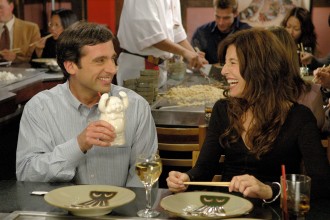In brief: An attempt to find the ‘best’ poets in Britain since 2005. The poets are awarded points (based on awards, anthologies and magazine publications), and then organised into tables. Who’ll be the Manchester United of the poetry world? (And, if I ever expand this to include international awards, who’ll be Barcelona?)
THE CHAMPIONSHIP
Short explanation for readers who’d rather spend 127 hours trapped under a rock trying to cut their own arm off than have anything to do with football: The Championship is the league directly below the Premiership and contains the teams ranked 21st to 44th. Here are the corresponding poets:
21. Matthew Sweeney (130 points)
22. Philip Gross (125)
= John Kinsella (125)
= Peter Porter (125)
25. Mick Imlah (120)
26. Penelope Shuttle (115)
27. George Szirtes (110)
= Sam Willetts (110)
29. Ciaran Carson (105)
= John Fuller (105)
= Glyn Maxwell (105)
= Derek Walcott (105)
33. Carol Ann Duffy (100)
= Elaine Feinstein (100)
= Tim Liardet (100)
= Sharon Olds (100)
= Richard Price (100)
38. Helen Farish (95)
= Sarah Maguire (95)
40. Kate Bingham (90)
= Julia Copus (90)
= Jacob Polley (90)
43. Ian Duhig (85)
= Adam Foulds (85)
= Luke Kennard (85)
= Frances Leviston (85)
= Christopher Logue (85)
Post-match analysis
Matthew Sweeney misses out on the poetry Premiership purely on alphabetical order (just in case anyone thought this whole exercise was ‘fair’ in any way). He was one of only three poets in the top 50 to have won a prize in the National Poetry Competition, which suggests to me either (a) Top poets rarely bother to enter the National, or (b) anonymous judging has a significant impact on who wins poetry competitions.
Philip Gross, winner of the T.S. Eliot prize for 2009, is fighting for the second automatic promotion spot with two Australian poets, Peter Porter (who published his final collection under the wonderfully audacious title Better than God) and John Kinsella.
Among the heavyweights grouped just below them are Carol Ann Duffy, the Poet Laureate, and Derek Walcott, the Nobel Laureate. I’d expected both to be ‘Premiership poets’, but CAD has been largely ignored by the prize juries in the last few years (not a single nomination for the Forward or the Costa) and Derek Walcott seems to be in a similar position. Conspiracy theorists may wish to note that a judging panel chaired by Ruth Padel chose to overlook Walcott’s White Egrets for last year’s Forward Prize; readers who aren’t easily swayed by conspiracy theories may be more inclined to agree with Hugo Williams, who described White Egrets as ‘not [Walcott’s] best thing… a bit florid.’
Closer to the relegation battle are a selection of younger poets who will surely be moving up the table in the next few years. Frances Leviston, Luke Kennard and Jacob Polley are among the writers who fall into that category: expect them to be serious contenders for the major prizes very soon.
Several big names missed out on the top 44 altogether: Paul Muldoon, Vicki Feaver and Alan Jenkins scraped into the top 50 (Muldoon is another puzzling omission from recent shortlists), but poets of the calibre of Wendy Cope, Craig Raine, Derek Mahon, Charles Tomlinson, Gillian Clarke and Robert Minhinnick finished outside the top 200.
*Who’s  number one? Who’s number one? (to quote John Berryman): find out soon…




